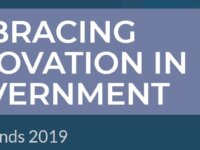The third annual trends report by the OECD-OPSI and the UAE’s Mohammed Bin Rashid Centre for Government Innovation (MBRCGI) presents a global review of the ways governments are transforming their operations and improving the lives of their people through innovation.
Global: Global Trends
We are happy to announce that OECD Secretary-General Angel Gurría launched OPSI’s report “Embracing Innovation in Government: Global Trends 2019” today at the World Government Summit! The event in Dubai is the largest annual gathering in the world focused on shaping the future of governments through innovation. The report is the result of a global innovation review conducted by OPSI in partnership with UAE’s Mohammed Bin Rashid Centre for Government Innovation (MBRCGI). The review…
Blockchain technology evolved from a niche subject to the hottest tech disruption buzzword, but there is still a lot of confusion about the subject. Without a clear understanding of what Blockchains are, their potential public sector potential impact is sometimes misunderstood or, more often, ignored. The guide discusses how Blockchain may (and may not) apply to government.
OPSI reflects on the Edge of Government event in Dubai.
The frameworks for creating and managing the rule of government, as reflected in policies, legislation and regulation, are still based on a paper paradigm. In a digital world this creates poor service experiences and often the intent of a policy is not achieved. Instead if we co-design authoritative machine-consumable rules we can provide better services for citizens, better delivery of policy intent, and enable communities, NGOs and private sector to be part of a government service ecosystem.
The Specialized Inspection Agency of Tuv Province and the Government of Mongolia Feasibility Study and piloted a project called “Counterfeit drug detection using Blockchain and AI” to eliminate fake drugs from the market, and save the thousands of lives. The project will increase safety and transparency of the drug industry, tracing the pharmaceutical supply chain in Mongolia, as well as globally.
Reliable transportation is the primary barrier to stable employment for shift workers. Our solution leverages existing technology to provide “transportation as a benefit” through an integrated network of on-demand transportation options. We will quantify savings for employers due to reduced turnover and increased employee productivity, incentivizing them to fund the program long-term.
This blog was authored by former intern, Théo Bourgery OPSI is seeking your comments and edits on a draft working paper “Blockchains Unchained: The Implications of Blockchain Technologies for the Public Sector”. Let us know what you think by 20 March! Blockchain technology has evolved from a niche subject to the hottest tech disruption buzzword, but there is still a lot of confusion around the subject. Without a clear understanding about what blockchains are, their…
We are happy to announce that OECD Secretary-General Angel Gurría launched OPSI’s report “Embracing Innovation in Government: Global Trends 2018” today at the World Government Summit! The event in Dubai is the largest annual gathering in the world focused on shaping the future of governments through innovation. The report is the result of a global innovation review conducted by OPSI in partnership with UAE’s Mohammed Bin Rashid Centre for Government Innovation (MBRCGI). The review…
The annual trends report by the OECD-OPSI and the UAE’s Mohammed Bin Rashid Centre for Government Innovation (MBRCGI) identified three key trends in public innovation: identify, systems approaches and enablers and inclusiveness to vulnerable populations.









